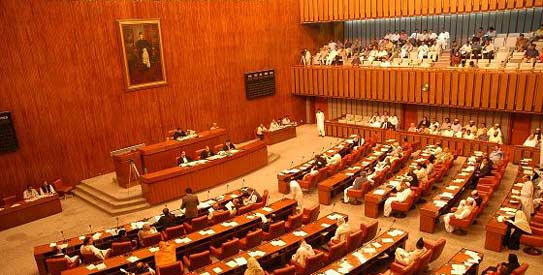
ISLAMABAD: The Senate on Friday passed a bill which amends the National Database Registration and Registration Authority (Nadra) Act 2000 by enhancing the punishment from one year to 10 years for deliberately providing false information for obtaining Computerised National Identity cards (CNICs).
The bill adopted by the National Assembly last year moved in the Senate by Leader of the House Nayyar Hussain Bokhari and was passed within minutes without any opposition at the end of proceedings on the last day of the session.
Since offences entailing punishment of less than three years are non-cognizable according to schedule II of the code of criminal procedure, federal investigation agencies and police were handicapped in acting effectively against people providing false information and Nadra employees involved in providing fake CNICs. Now the FIA and police will have powers to arrest such people without any warrant.
The Senate also adopted the Criminal Law (amendment) Bill providing for rigorous imprisonment of up to 14 years for those committing or abetting in tampering with petroleum pipelines for theft or disruption of supply. Damaging or destroying transportation and transmission lines by an act of subversion by explosive material will also entail a punishment of up to 14 years and not less than seven years in any case, with a fine of not less than one million rupees.
The bill also makes tampering with domestic, commercial and industrial gas metres a cognizable offence.
The house also adopted reports of the Senate Standing Committee on Finance on the gas infrastructure development cess bill 2011, and the petroleum products (petroleum levy) amendment bill, 2011. The house was informed that Minister for Petroleum Dr Asim Hussain had assured the committee that the gas development cess would not apply to domestic consumers and the amendment proposed by the committee would be incorporated when the National Assembly adopted the bill.
Members of the house including Ishaq Dar, Prof Khurshid Ahmed and Dr Safdar Abbasi said the bills did not fall under the ambit of money bills under Article 73 of the Constitution.
Mr Ishaq Dar said that an approval from the cabinet should have been sought before moving the bills in the house.
“The prime minister has no powers to approve substantial business, but the authority rests with the cabinet,” he remarked. He said the jurisdiction of the Senate had been transgressed by circumventing normal legislative business and bringing legislation in the form of money bills.
Dr Safdar Abbasi of PPP criticised efforts to what he called bulldozing the bills.
He said Rs34 billion cess on fertilizers, CNG and IPPs would be passed on to consumers.
Earlier, during the question-hour session, Dr Asim Hussain informed the House that a new petroleum exploration and production policy was being evolved, offering additional incentives to investors in the sector to enhance oil and gas exploration activities in the country.
He said the government had granted 133 exploration licences and efforts were being made to put newly-made discoveries on production in the next few years.
He said the government was pursuing an aggressive policy of not only importing_LNG and LPG but also bolstering local production of gas to mitigate hardships of the people. He said there would be shortage of gas in winter season because of a gap in demand and supply and burden would be shared with all provinces on an equitable basis.
He said the gas demand stood at eight billion cubic feet while the production was around 4.2 billion cubic feet. He said the country had estimated recoverable tight gas reserves of 24 tcf. Initially, 100 to 150 mmcfd would be added depending on its success rate.
Dr Asim Hussain said Pakistan would also import gas from Iran through the gas pipeline project to meet its growing energy requirements.











































Dear visitor, the comments section is undergoing an overhaul and will return soon.